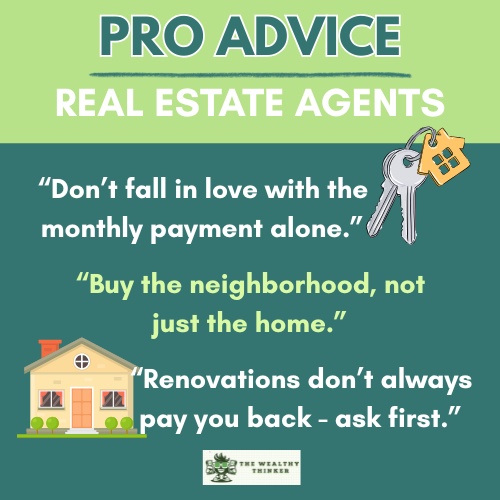Imagine sitting across from a seasoned real estate agent – someone who’s helped hundreds of people navigate:
- bidding wars
- price drops
- inspection pitfalls
- financing chaos
Now imagine they only have five minutes to give you their most important advice. No fluff, no filler- just the stuff that can truly make or break your financial future when buying or selling a home.
These aren’t the tips you’ll find in a flashy listing description or a TikTok video with elevator music.
These are the real-world, financial moves agents wish more people would understand – whether you’re a first-time buyer, a seller trying to maximize profit, or a long-term homeowner considering your next move.

Real Estate Agent Advice: If They Had 5 Minutes With You, Here’s What They’d Say
1. “Don’t Fall in Love With the Monthly Payment Alone”
One of the biggest mistakes real estate agents see? Buyers who focus solely on what their mortgage lender says they can afford each month.
You hear, “Your monthly payment will be $2,100,” and it sounds fine. But here’s the truth: that number doesn’t include everything.
Your actual monthly cost of homeownership includes:
- Property taxes – which can rise with reassessments or local tax increases
- Homeowners insurance – which is creeping up nationwide, especially in areas prone to flooding, fires, or storms
- HOA fees – that can tack on hundreds of dollars a month
- Utilities, repairs, and maintenance – especially in older homes or larger properties
The trap: Focusing only on mortgage estimates can lead you to buy “too much house,” leaving no wiggle room for emergencies, repairs, or future financial goals.
What your agent would say: “Let’s run the full cost picture together. I’ve seen too many clients blindsided by things they didn’t budget for – especially after closing.”
2. “Think Like a Seller Before You Buy”
It’s easy to get swept up in granite counters and cute built-ins, but experienced agents know to evaluate every home from a resale perspective – before you sign anything.
Why? Because life changes. Most people move within 6–10 years, and if you bought a home that’s tough to resell, you could lose big, even in a “hot” market.
Red flags agents look for:
- The most expensive home on the block (you won’t recoup the same value later)
- Poor layout or awkward room flow
- Homes with unusual features that won’t appeal to future buyers
- Unpermitted additions that will scare off lenders and appraisers
What your agent would say: “I know you love this house, but if the market shifts, you’ll wish you’d picked something more ‘market-proof.’ Let’s find something you love – and that future buyers will love too.”
3. “Buy the Neighborhood, Not Just the Home”
The saying goes, “You can change the house, but you can’t change the neighborhood.” Agents live by this.
A home with good bones in a rising area will usually outperform a perfect house in a stagnant or declining neighborhood. Agents often track data the average buyer doesn’t even think to ask about – like new commercial projects, walkability, and future school zoning shifts.
What to look for:
- Rising property values over the last 5–10 years
- Planned infrastructure or transit projects
- Local business growth and walkability improvements
- Low turnover rate (people staying put is usually a good sign)
What your agent would say: “Let’s check what’s happening in this zip code – not just what’s on Zillow. There are major projects coming here in two years that could double your value if you buy now.”
4. “Never Skip the Pre-Approval – and Go Deeper Than the Bank’s Number”
Pre-approval isn’t just a formality – it’s a reality check. A lender might approve you for a $600,000 home. That doesn’t mean it’s a good idea.
Most banks give you the maximum loan you can technically afford, not what’s actually comfortable for your lifestyle.
The smarter move: Determine your budget based on your income, goals, and tolerance for risk. That way, you’re not “house poor” the moment you move in.
What your agent would say: “Let’s use the pre-approval as a ceiling, not a goal. You want room for travel, savings, and emergencies – not just a pretty house and a tight budget.”
5. “Renovations Don’t Always Pay You Back – Ask First”
Agents constantly meet sellers who’ve poured $40,000 into a kitchen renovation and expect it to raise their home value by $60,000. But the math doesn’t always work that way.
In many markets, over-improving is a real issue. Fancy upgrades can outprice your home for the neighborhood, turning off buyers or inflating your expectations.
Upgrades that often don’t pay off:
- Luxury finishes in entry-level neighborhoods
- Swimming pools (which can deter families with kids or those worried about maintenance)
- High-personalization projects (like themed rooms or unique flooring)
What your agent would say: “Don’t sink $50K into a kitchen unless we know the comps justify it. You might be better off with new paint, fixtures, and curb appeal – and pocket the difference.”
6. “Don’t Wait for the Market to Crash – Time Your Life, Not the Market”
You’ve probably heard it: “I’m just going to wait until prices come down.” It’s one of the most common buyer (and seller) myths agents hear—and one of the most financially risky.
The truth? Timing the market is nearly impossible. Prices may dip slightly, but interest rates could rise. Or inventory might dry up. You could wait years – and end up spending more in rent or missed equity growth.
Instead, agents recommend asking:
- How long do you plan to stay in the home?
- What’s happening in your personal life or job stability?
- Could you comfortably afford this home for the long haul?
What your agent would say: “I don’t care what the Fed does next month – if this house works for your life, your job, and your future, it’s worth moving on now.”
7. “Your Agent is a Financial Resource – Use Them That Way”
Most people don’t realize just how many financial levers a great real estate agent can pull. They’re not just unlocking doors—they’re often unlocking better deals, lower fees, and smarter long-term decisions.
Smart questions to ask your agent:
- “Are there any local grants or first-time buyer programs?”
- “Can we negotiate seller concessions or a rate buydown?”
- “Is this price realistic based on comps?”
- “Do you know lenders or inspectors who will go the extra mile?”
What your agent would say: “You’d be surprised what’s negotiable. Let me make a few calls – I’ve done this before.”
Getting Real Estate Agent Advice: Bottom Line
A real estate agent doesn’t just help you buy or sell a home – they help you make some of the biggest financial decisions of your life.
And if they had just five minutes with you, they’d want you to avoid the common traps and take advantage of the lesser-known strategies that:
- save money
- reduce risk
- create long-term wealth
Whether you’re just starting your home search or considering listing your property, remember: the smartest move is the one that fits your financial reality, not just the market headlines.
So next time you walk into a showing or think about listing your home, ask yourself: “Am I thinking like a buyer… or a smart investor?”
Top 10 Key Parts of Buying Real Estate Every Potential Home Buyer Should Know


















